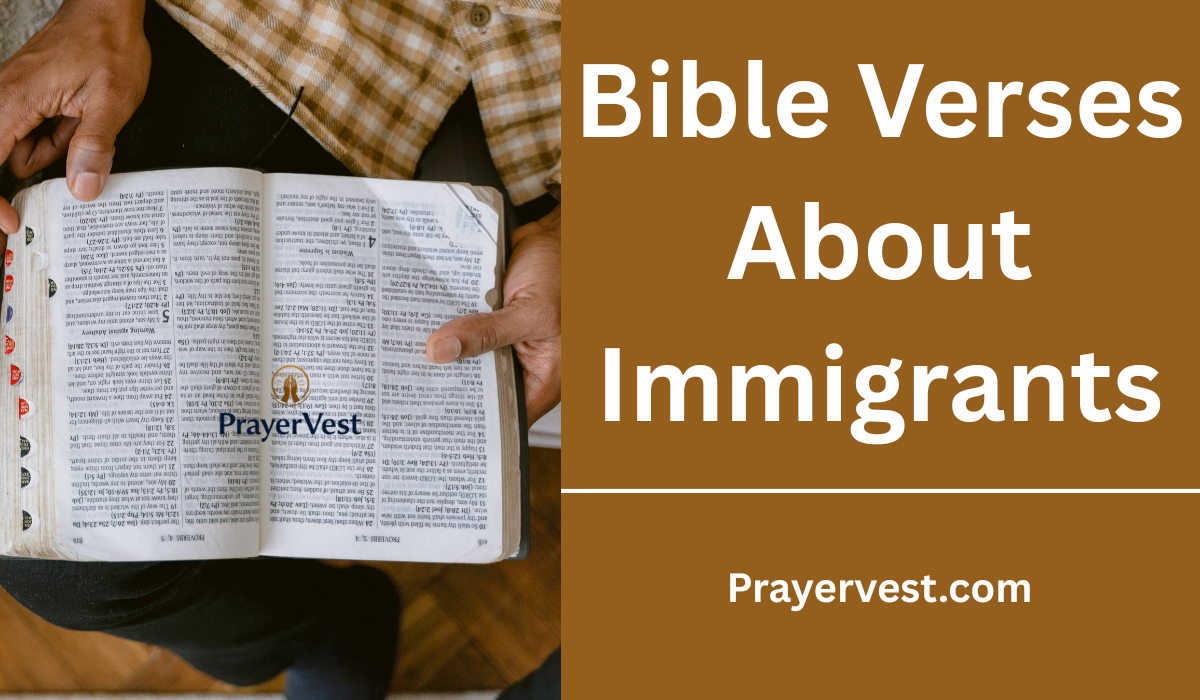Bible Verses About Immigrants. Scripture’s perennial subject of immigration is interwoven with the tales of God’s people. The Bible frequently depicts the experiences of immigrants, strangers, and sojourners, from Abraham leaving his homeland in response to God’s call, to Israel’s wilderness trip, and even to the Holy Family’s flight to Egypt.
These verses serve as a reminder that God loves people who live far from their birthplace and that He requires His people to treat them with kindness, justice, and hospitality. God’s Word does not ignore or forget immigrants; rather, it honors their tales as a component of His redemptive plan.
By connecting believers to their own spiritual and historical heritage, the Bible highlights empathy for immigrants. Israel was frequently reminded that they were also foreigners in Egypt at one point, which influenced their mission to treat strangers with justice and compassion.
By encouraging His people to embrace those who are weak and in need, this repeated demand demonstrates God’s compassion and inclusion. By emphasizing these lines, we can see that God not only recognizes the difficulties faced by immigrants but also gives guidance on how communities should treat them: with respect, love, and dignity.


Examining Bible passages concerning immigration provides consolation and conviction. These verses reassure immigrants that God is mindful of their path, challenges, and aspirations. For others, they offer direction on how to react with justice, compassion, and love akin to that of Christ. The eternal truths of Scripture remind us that every individual, regardless of their background, is formed in God’s image and deserving of care in a world where immigration is still a pressing and occasionally contentious subject. By examining these texts, we see that welcoming immigrants is an expression of obedience to God’s will as well as charity.
40 Inspiring Bible Verses About Immigrants (2026)
1. Exodus 22:21
“Do not mistreat or oppress a foreigner, for you were foreigners in Egypt.”
God reminds Israel of their past as immigrants in Egypt, commanding them to treat foreigners with kindness and justice. This verse emphasizes empathy, urging God’s people to extend compassion because they themselves once lived as strangers in a foreign land.
2. Leviticus 19:34
“The foreigner residing among you must be treated as your native-born. Love them as yourself, for you were foreigners in Egypt. I am the Lord your God.”
This verse establishes the principle of equality and love toward immigrants. It calls God’s people to extend the same dignity, care, and acceptance to foreigners as they would to their own, rooting this command in God’s authority and love.
3. Deuteronomy 10:19
“And you are to love those who are foreigners, for you yourselves were foreigners in Egypt.”
Here, God commands His people not only to accept but to actively love immigrants. This instruction ties directly to Israel’s own story of exile and deliverance, teaching that compassion should flow from a place of remembrance and gratitude.
4. Jeremiah 7:6
“If you do not oppress the foreigner, the fatherless or the widow and do not shed innocent blood in this place, and if you do not follow other gods to your own harm…”
Jeremiah highlights God’s concern for justice, specifically naming foreigners alongside the most vulnerable. The verse teaches that true worship includes treating immigrants fairly and protecting their rights, aligning with God’s heart for justice.
5. Zechariah 7:10
“Do not oppress the widow or the fatherless, the foreigner or the poor. Do not plot evil against each other.”
This passage reinforces the consistent biblical message of protecting immigrants. It warns against mistreatment or exploitation of the vulnerable and calls for a community rooted in compassion, justice, and moral integrity.
6. Malachi 3:5
“So I will come to put you on trial. I will be quick to testify against sorcerers, adulterers and perjurers, against those who defraud laborers of their wages, who oppress the widows and the fatherless, and deprive the foreigners among you of justice, but do not fear me,” says the Lord Almighty.
God declares His judgment against those who exploit or oppress the vulnerable, including immigrants. This verse underscores that mistreating foreigners is not only a social issue but a spiritual offense, placing such injustice alongside serious sins like adultery and sorcery.
7. Matthew 25:35
“For I was hungry and you gave me something to eat, I was thirsty and you gave me something to drink, I was a stranger and you invited me in.”
In this teaching, Jesus equates welcoming strangers—including immigrants—with serving Him directly. This verse shows that acts of kindness toward those who are vulnerable reflect true discipleship and love for Christ Himself.
8. Hebrews 13:2
“Do not forget to show hospitality to strangers, for by so doing some people have shown hospitality to angels without knowing it.”
Hospitality to immigrants and strangers is elevated here as a sacred act with divine potential. The verse recalls stories like Abraham entertaining angels unawares, reminding believers that welcoming others can lead to unexpected blessings.
9. Ephesians 2:19
“Consequently, you are no longer foreigners and strangers, but fellow citizens with God’s people and also members of his household.”
Paul explains that in Christ, divisions of nationality or citizenship disappear. Believers—once strangers—are now united as one family in God’s household, breaking down barriers that separate people.
10. Ruth 2:10
“At this, she bowed down with her face to the ground. She asked him, ‘Why have I found such favor in your eyes that you notice me—a foreigner?’”
Ruth’s story highlights God’s care for immigrants. As a Moabite, she was vulnerable, but Boaz’s kindness demonstrates how God calls His people to provide protection, dignity, and support to foreigners in their midst.
11. Deuteronomy 24:17
“Do not deprive the foreigner or the fatherless of justice.”
This law insists that courts and communities must provide equal protection to immigrants and the vulnerable. Because Israel’s identity was shaped by its own past as sojourners in Egypt, justice for the foreigner is a moral imperative rather than optional charity. The verse teaches that fair treatment under the law is a central expression of covenantal faithfulness and communal holiness.
12. Deuteronomy 24:14–15
“Do not withhold the wages of a hired worker.”
God commands timely and just payment to laborers, explicitly including the poor and foreign hired hands. This protects immigrants from economic exploitation and recognizes their dignity as workers created in God’s image. Scripture links economic justice to obedience — withholding wages is both a social and spiritual offense.
13. Exodus 23:9
“Do not oppress a foreigner; you yourselves know how it feels.”
Here Israel’s memory of exile becomes the basis for empathy: because they were once strangers, they must not mistreat others who are strangers. The verse reframes immigration policy as an ethical formation — national memory should shape how a people treat newcomers. It calls for compassionate policies and personal hospitality rooted in remembered vulnerability.
14. Numbers 15:15–16
“One law shall apply to the native and to the foreigner.”
This establishes legal equality: the same covenant obligations and protections apply to both native-born and resident foreigners. By insisting on a single standard, Scripture undermines legal discrimination and promotes unity within the community. Religious life, worship, and justice are therefore designed to include — not exclude — the sojourner.
15. Leviticus 19:33
“When a foreigner resides among you, do not oppress them.”
Leviticus frames care for the stranger as a recurring command that shapes day-to-day behavior. The text treats the foreigner as a neighbor deserving protection, not a problem to be managed. This moral orientation transforms communal life by making hospitality and restraint normative acts of holiness.
16. Leviticus 25:35
“Support your poor neighbor; do not be hard-hearted or tight-fisted toward them.”
The Jubilee and social-welfare laws require Israelites to assist those who fall into poverty, including foreigners who live among them. This institutionalized compassion prevents permanent marginalization and fosters social cohesion. The verse shows that economic systems in Scripture are judged by how they treat the least advantaged.
17. Deuteronomy 10:18
“He defends the fatherless and loves the foreigner.”
God is portrayed as an advocate for the weak and the outsider, which becomes the moral model for Israel’s own conduct. Because God loves the foreigner, God’s people are called to reflect that same love in policy and practice. Spiritual devotion, therefore, is inseparable from concrete acts of justice toward immigrants.
18. Ruth 1:16
“Where you go I will go.”
Ruth’s pledge to Naomi is a powerful, personal example of immigrant faithfulness and belonging. As a Moabite who chose to join Israel, Ruth models how a foreigner can adopt the people, worship, and way of life of a new home. Her story also shows how the receiving community (Boaz, Naomi) can welcome and bless those who humbly seek refuge and integration.
19. Esther 2:7
“Mordecai had brought up the orphan Esther as his own daughter.”
Esther’s narrative reminds us that foreigners can play decisive roles in the life of a nation and that protective kinship (Mordecai’s care) matters. Though an outsider by birth, Esther becomes Israel’s queen and a savior-figure for her people. The book highlights both the vulnerability of immigrants and their potential to be instruments of deliverance and justice.
20. Psalm 146:9
“The Lord watches over the foreigner and sustains the fatherless.”
This psalm celebrates God as protector of the marginalized, including the foreigner. Worshiping communities are invited to join God’s care, making compassion an act of worship. The verse reassures immigrants that God’s concern follows them even when human institutions fail.
21. Isaiah 56:3-7
“My house will be called a house of prayer for all nations.”
Isaiah envisions the temple and worship life as open to foreigners who attach themselves to God’s covenant. The passage expands God’s mission beyond ethnic Israel to include outsiders who keep God’s ways, promising inclusion and blessing. It offers a prophetic corrective to exclusionary religion and a theological basis for welcoming immigrants into spiritual life.
22. Galatians 3:28
“There is neither Jew nor Greek…”
Paul’s radical claim erases ethnic and social divisions within the body of Christ: identity in Christ supersedes national or cultural boundaries. For immigrants and hosts alike, this means the church is called to live out a unity that reflects God’s reconciling work. The verse is a theological foundation for a church culture that treats newcomers as equals, not outsiders.
23. Colossians 3:11
“Here there is no Greek or Jew.”
Paul again emphasizes the leveling power of the gospel — in Christ distinctions that to the world matter (ethnicity, social status) are transcended. This ethic should shape congregational life so that immigrants experience belonging and full participation. The passage challenges cultural preferences that make the church inhospitable.
24. 1 Corinthians 12:13
“For in one Spirit we were all baptized into one body.”
Paul’s image of the church as one body underlines mutual dependence: every member, including immigrants, contributes essential gifts. The verse encourages communities to see newcomers not as burdens but as vital participants in the life of faith. Ecclesial identity must therefore be inclusive and honoring of diversity.
25. 1 Peter 2:11
“You are aliens and strangers in the world.”
Peter uses the language of sojourning to describe the Christian life, which can foster solidarity with literal immigrants. If believers understand themselves as temporary residents on earth, they are better positioned to empathize with and protect those who are literally strangers. The verse shapes an ethic of good conduct among people who are both pilgrims and hosts.
26. Deuteronomy 14:28–29
“Include the Levite, the stranger, the fatherless and the widow in your tithes.”
The tithe system includes explicit provision for non-citizens who live among Israel, ensuring they share in the community’s blessings. This social arrangement prevents permanent exclusion and recognizes the foreigner’s claim to basic sustenance. The law thus integrates charity into ordinary religious practice rather than making it exceptional.
27. Deuteronomy 16:11
“Rejoice before the LORD — include the Levite and the sojourner.”
Feasts and religious celebrations are to be communal, with foreigners invited to participate and rejoice. Inclusion at festivals strengthens social bonds and signals that immigrants belong to the life of the people. The passage teaches that ritual participation is a powerful avenue for integration.
28. Jeremiah 22:3
“Do what is just; do not oppress the foreigner.”
Jeremiah links political leadership to justice: rulers are judged by how they treat vulnerable populations, including foreigners. The prophetic critique makes mistreatment of immigrants a public sin with national consequences. True righteousness requires structural justice, not merely private piety.
29. Acts 17:26
“From one man God made every nation.”
Paul’s speech at Athens underscores the common humanity and unity of all peoples under God’s creative purpose. This worldview undercuts racist or xenophobic notions that justify exclusion. It provides a theological basis for humane and dignified treatment of immigrants as fellow image-bearers.
30. Matthew 10:40
“Whoever receives you receives me.”
Jesus’ promise to his disciples extends the ethic of reception: how we receive Christ’s messengers mirrors how we receive Christ. Applied to immigrants, the teaching elevates hospitality into a spiritual act — welcoming the stranger becomes an act with eternal significance. The verse presses believers to treat newcomers with reverence and care.
31. Romans 15:7
“Accept one another, just as Christ accepted you.”
Paul urges the church to model Christ’s inclusive acceptance, which welcomes those who are different without demanding assimilation. This acceptance fosters peace and mutual encouragement, particularly important where cultural and linguistic differences might divide. The verse calls the community to make space for immigrants to flourish in faith and fellowship.
32. Hebrews 11:13
“They were foreigners and strangers on earth.”
The heroes of faith are described as sojourners whose hope was anchored in God, not in earthly permanence. Their spiritual identity as strangers invites empathy for those who live as outsiders today. The passage reframes foreignness as part of faithful witness rather than mere marginalization.
33. Luke 10:33-34
“A Samaritan took pity, bandaged his wounds, and cared for him.”
The Good Samaritan story reframes neighborliness beyond ethnic boundaries: compassion crosses cultural barriers and challenges prejudiced assumptions. In the context of immigration, the parable calls people to risk closeness and costly care for those who are different. It shows that true righteousness is demonstrated in practical, sacrificial mercy.
34. Leviticus 19:9-10
“When you reap the harvest, leave the gleanings for the poor and the foreigner.”
Gleaning laws ensured that the poor and resident aliens could gather food from the fields, institutionalizing care into agriculture. This creates a safety net rooted in neighborly responsibility, not mere charity. It models an economy where the vulnerable — including immigrants — have guaranteed access to subsistence.
35. Deuteronomy 24:19
“Leave the forgotten sheaves for the foreigner and the poor.”
The instruction to leave what falls during harvest reflects an ethic of intentional provision for those on society’s margins. By mandating corporate practices that sustain outsiders, the law fosters a communal habit of inclusion. This demonstrates that social systems can be designed to protect rather than exclude strangers.
36. 1 Timothy 5:10
“She has shown hospitality to strangers.”
Timothy’s list of qualifications for godly elders’ households includes hospitality, explicitly recognizing care for strangers as a mark of faithfulness. The New Testament values domestic practices that extend hospitality to newcomers as spiritual virtues. This grounds immigration hospitality not only in public policy but in everyday Christian discipleship.
37. Revelation 7:9
“A great multitude from every nation, tribe, people and language.”
John’s vision of worship before God’s throne showcases the kingdom as genuinely global and multiethnic. The eschatological picture honors diversity and suggests that God’s redeemed people include immigrants and natives alike. The passage inspires churches to embody that future reality now by welcoming and celebrating those from every nation.
38. Psalm 68:5-6
“A father to the fatherless and a defender of widows.”
These verses celebrate God’s protective care for those without family or status — groups that often overlap with immigrant populations. The psalm invites the community to imitate God’s protective posture by defending and integrating the vulnerable. It envisions a society organized by compassion rather than exclusion.
39. Acts 10:34-35
“God shows no partiality; in every nation anyone who fears him is acceptable.”
Peter’s realization that God accepts people from every nation broke major ethnic barriers in the early church. It legitimizes the inclusion of Gentiles and, by extension, affirms that faith — not nationality — determines belonging in God’s family. This conviction reshapes mission and community life to include immigrants without prejudice.
40. James 2:8
“Love your neighbor as yourself.”
James insists that faith must be expressed in neighborly love, which includes how we treat those who are different or vulnerable. For immigrants, this command becomes a practical ethic: love calls for tangible care, fairness, and hospitality. The verse connects doctrine and deed — true religion is measured by how the stranger is treated.
Conclusion
In summary, a recurring theme in Bible passages about immigrants is God’s justice, kindness, and compassion for people who live far from home. Scripture makes it very evident that accepting immigrants is not an option—rather, it is a reflection of God’s own heart, as evidenced by the Old Testament regulations that required Israel to care for the alien and the New Testament exhortation to love our neighbor as ourselves. These verses serve as a reminder that everyone has the image of God and is worthy of respect, kindness, and dignity, regardless of their background.
In the end, considering these passages pushes Christians to demonstrate their faith in practical ways. We are urged to show the same grace that God shows us by being hospitable, standing up for justice, or just being there for one another. The journey of the immigrant serves as a reminder that we are all temporary residents of this planet who yearn for our permanent home. In addition to obeying God’s Word, we demonstrate His kingdom—where all peoples and nations are included in His love—by welcoming and caring for immigrants.






